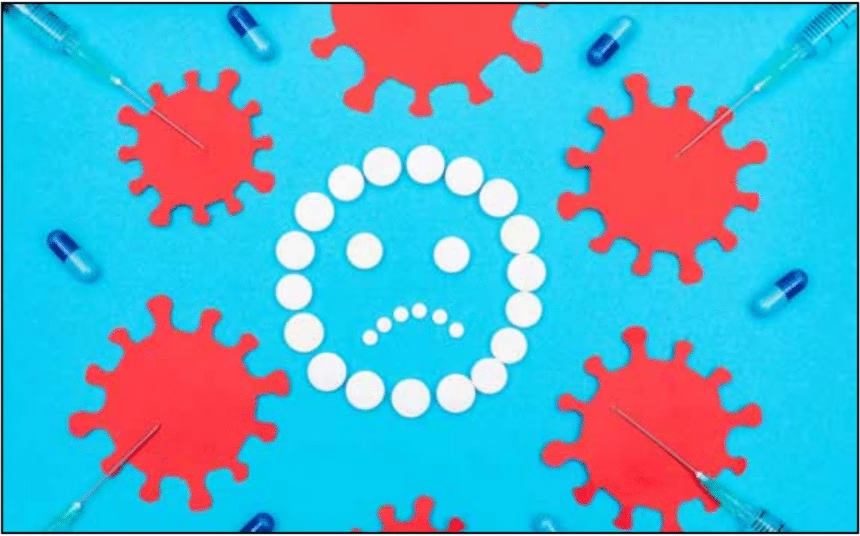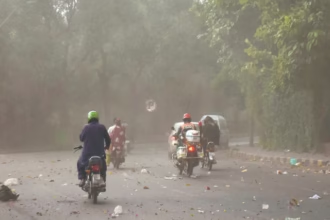Muhammad Sufian, 8, admitted to Benazir Children Hospital Mardan (BCHM) with a high-grade fever, has taken different antibiotics for almost 24 days.
“Before admission to BCHM,” shares Sufian’s father Aziz Ur Rehman. “My son was treated by local medical practitioners in clinics situated in Lundkhawar area of Mardan district, and then by doctors at nearby hospitals. They all used a variety of antibiotics.”
Sufian’s medical history shows that the antibiotics administered to him include Cefixime and Augmentin that were given orally, while Ceftriaxone, Azithromycin, Grasil, and Mycacine were administered as injections. None of these could not develop positive response.
According to Dr Abbas Ali Khan, a pediatrician at BCHM, a sample had been sent to the lab for a culture test, but since the result would take seven days, Meropenem injections were administered in the meantime which showed a positive response against the infection. Finally, Sufian’s temperature began to drop.
“Based on previous culture test observations and clinical criteria, Cefoperazone – Sulbactam, Tanzo, and Meropenem injectable antibiotics are the remaining three weapons against infections in such resistant cases,” he says.
Heath experts said that despite growing concerns over antimicrobial resistance (AMR), antibiotics are being offered to children without proper investigations and diagnosis in small clinics, and other medical facilities across Pakistan, and the situation is worsening day by day.
According to the report of the American Society for Microbiology, Pakistan ranks 176th out of 204 nations in AMR-related mortality per 100,000 people.
In 2019, the Global Research on Antimicrobial Resistance Project reported 59,200 deaths in Pakistan directly attributable to AMR, with an additional 221,300 deaths listed as being AMR-associated. AMR was therefore the third-leading cause of death for Pakistanis in 2019, behind cardiovascular disease and maternal/neonatal disorders.
“In the misuse and inappropriate use of antibiotics, parents, quacks, and even doctors are involved,” explains Dr Abbas Ali Khan. “Parents know the names of some common antibiotics and without a qualified doctor’s examination, get them from medical stores and without knowing the accurate strength and duration give them to their children who are sick. Quacks and non-qualified doctors, who run clinics in rural areas, also administer antibiotics without proper dosage to small children, and this is how antimicrobial resistance (AMR) develops among children.”
He mentioned that qualified doctors follow all protocols during the treatment of children, which usually takes 3 to 4 days. However, for immediate recovery in high grade fever, parents often rush their children to other medical facilities, where antibiotics are prescribed unnecessarily due to their pressure, he added.
“We mostly receive children aged 5 to 10 years with high temperature, who have already been treated with antibiotics by parents, quacks, or doctors in peripheral hospitals, where there is no concept of culture testing,” shares Dr Khan. “Culture tests conducted in the facility show that almost 90 percent children have developed resistance to various antibiotics, as the medicines were not administered to them properly.”
According to health experts, antibiotics are given to children even for viral infections such as sore throats, colds, coughs, fever, flu, and condition of mild diarrhea, where antibiotics do not provide any benefit.
They shared that nowadays the resistance to different antibiotics is observed in enteric fever, tuberculosis, urinary tract infections, and gastroenteritis.
Recent findings by Aga Khan University, in Karachi, show that Pakistan has witnessed one of the world’s largest outbreaks of extensively drug-resistant (XDR) typhoid, which began in Hyderabad in 2016.
By 2018, over 5,000 confirmed XDR Salmonella Typhi cases had been reported, nearly 70 percent of them in Karachi.
“In Pakistan, this silent epidemic is taking a firm grip, especially among children who are our youngest and most vulnerable,” says Dr Imran Nasir, Associate Professor at Aga Khan University, Karachi. “Hospitals across the country are seeing an alarming surge in antibiotic resistance, much of it stemming from the widespread and often reckless use of antibiotics.”
He explained that due to weak diagnostic capacity, with many clinics lacking access to timely lab tests, doctors often prescribe antibiotics with a “just in case,” approach, rather than based on confirmed diagnosis of bacterial infections. Another contributing factor, he added, is poor antibiotic stewardship.
“According to a multi-centre study, most Pakistani hospitals lack clear guidelines on rational antibiotic use, and few have formal stewardship programs in place,” explains Dr Nasir. “There are prevailing misconceptions even among some in the physician community, who believe antibiotics are effective against viral infections or fear losing patients’ trust if they don’t prescribe something strong. The unnecessary use of antibiotics may offer short-term relief but carries long-term consequences.”
He added that overexposure to antibiotics disrupts the gut microbiome, which plays a critical role in immune development.
“This leaves children more vulnerable to future infections, allergies, and even obesity,”says Dr Nasir. “Moreover, it increases the risk that bacteria in a child’s body will become resistant, turning minor infections into life-threatening ones,” he explains.
He said that in Pakistan stronger stewardship, tighter regulations, better diagnostics and public awareness are urgently needed. Until then, antibiotics will continue to be handed out like candy, and the bacteria will keep getting stronger and smarter, he warned.
To combat antimicrobial resistance, under the AMR National Action Plan 2.0, the Khyber Pakhtunkhwa (KP) government has established an AMR secretariat and has notified a provincial surveillance committee, and a technical working group, shared Dr Musawir Manzoor, a surveillance officer at Integrated Disease Surveillance and Response System (IDSRS), KP health department.
He added that for the awareness among local community the department has conducted awareness activities across the province during the AMR week last year in November.
Dr Shafa Haidar, Director of Registration at the KP Health Care Commission (KPHCC), shared that besides licensing health facilities, regulating pharmacies and rising public awareness, the commission is also combating against quackery, a major contributor to AMR.
She added that the KPHCC conducted raids and took legal action against quacks and illegal healthcare facilities to dismantle practices that contribute to antimicrobial resistance.
The Global Research on Antimicrobial Resistance (GRAM) project suggests that bacterial antimicrobial resistance will cause 39 million deaths between 2025 and 2050 globally – equating to three deaths every minute.
The study forecasts a 67.5 percent increase in annual deaths directly attributed to bacterial AMR, rising from 1.14 million in 2021 to an estimated 1.91 million in 2050. Deaths associated with AMR are also expected to increase by 74.5 percent, from 4.71 million in 2021, to 8.22 million deaths in 2050.
From rural clinics to urban hospitals, antimicrobial resistance is eroding treatment options, turning routine infections into life-or-death battles. If left unchecked, Pakistan’s overreliance on antibiotics will continue to shrink the arsenal of drugs that can save lives, leaving doctors with fewer — and often more toxic — options. The battle against antimicrobial resistance is not only a medical challenge but also a social one, demanding stricter regulations, better diagnostics, and a cultural shift in how we perceive antibiotics. Every unnecessary prescription, every self-medicated dose, is another step towards a future where common childhood infections become untreatable. Protecting our children means acting now — before the medicines we trust become relics of the past.
Abdur Razzaq is a Peshawar-based multimedia journalist. He tweets @TheAbdurRazzaq
All facts and information are the sole responsibility of the writer









